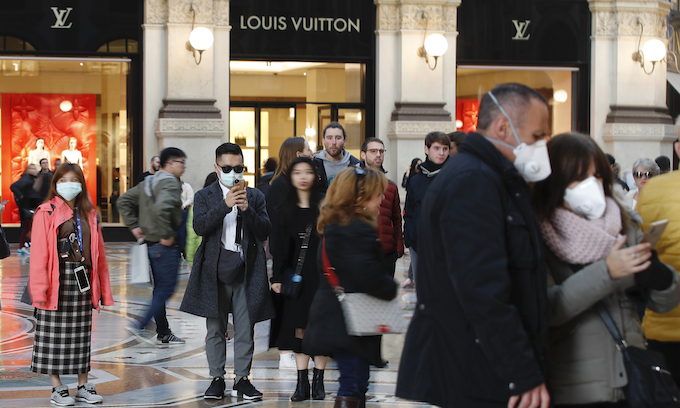South Korea sounded the alarm over the new coronavirus Sunday, raising its alert level to “red” as cases of COVID-19 soared to more than 600 and its death toll climbed to six.
Iran’s case count and death toll continued to mount, sparking fears of a wider spread in the Middle East. Italian authorities set up quarantines in economically vital regions of the north and postponed top-flight soccer matches.
Taken together, the hot spots raised new questions about how the virus from China spreads and whether it will be contained or become a global pandemic.
“The window of opportunity is narrowing,” World Health Organization Director-General Tedros Ghebreyesus said Saturday.
South Korean President Moon Jae-in said the mounting crisis is a “grave watershed.” The government’s decision to raise its virus alert level to “red,” the highest in the four-tier system, is the first move of its kind in over a decade, the Yonhap News Agency reported.
The country is securing more hospital beds to treat patients and is postponing the start of the coming school term.
More than half of the South Korean cases are linked to the Shincheonji Church of Jesus, particularly around the southeastern city of Daegu, so the religious group is curtailing activities at its venues.
Italy, meanwhile, emerged as the hot spot in Europe, with cases spiking from just three to well over 100 within a few days. Three people have died from infections, which are clustered in the northern regions of Lombardy and Veneto.
Officials canceled the famous Carnival of Venice to try to halt the virus’ spread. School officials in Milan suspended classes, and some fashion houses will shut spectators out of their shows this week.
About 60,000 soccer fans were expected to fill Milan’s iconic San Siro stadium to see whether local team Internazionale could tighten the close race with league leaders Juventus by defeating Sampdoria, but the match was scrapped as part of a response plan that also wiped games in Turin, Bergamo and Verona off Sunday’s scoreboard.
The coronavirus causes the illness COVID-19, which is marked by pneumonialike symptoms including respiratory distress and can lead to organ failure.
WHO hasn’t declared a global pandemic yet — China is home to the overwhelming bulk of cases and deaths — though it is urging the international community to lend its treasure and efforts to containing the outbreak before it spirals out of control.
President Trump on Sunday said the U.S. has a firm grip on COVID-19.
“We’re very cognizant of everything going on. We have it very much under control in this country,” Mr. Trump told reporters as he left for a trip to India.
WHO on Sunday reported over 77,000 cases and 2,400 deaths from the disease in China.
The communist government in Beijing was criticized for its belated response to the outbreak in December and its heavy-handed measures to control the virus, yet global health officials and Mr. Trump have praised their efforts to keep the disease from spiraling outward.
“It’s a big problem, but President Xi [Jinping] loves his country. He’s working very hard to solve the problem, and he will solve the problem,” Mr. Trump said.
Despite progress in reducing new cases, Mr. Xi told Beijing leaders Sunday that the situation remains grim.
“No victory should be lightly announced until there is a complete win,” Mr. Xi said, according to state-run Xinhua News Agency.
Outside of China, there have been over 1,700 confirmed cases in 28 countries. WHO’s official tally shows 17 deaths, though individual countries sometimes report additional deaths ahead of the public health arm of the United Nations.
WHO is “especially concerned” about rising numbers in Iran, where over 40 cases have been reported, mostly tied to the holy city of Qom.
As preventive measures, authorities suspended classes at universities in Tehran and over a dozen provinces and Turkey closed its border with Iran.
In East Asia, South Korea’s case count is swiftly approaching that of the Diamond Princess, a formerly quarantined cruise ship in Japan where 634 passengers and crew became infected before an evacuation last week.
Eighteen Americans who were flown back to the U.S. from the Diamond Princess have tested positive for COVID-19, the Centers for Disease Control and Prevention said Friday.
An additional 10 U.S. citizens tested positive in Japan and await CDC confirmation. Three citizens brought home from Wuhan, China — the epicenter of the outbreak — on previous State Department flights tested positive, bringing the total number of suspected or confirmed infections in repatriated Americans to 31.
Outside of repatriation flights, the agency reported 11 travel-related cases in the U.S., plus two people who were infected by the coronavirus from human-to-human transmission.
Diamond Princess passengers who tested positive are being treated at a special medical facility in Nebraska or facilities closer to their quarantine sites on military bases across the U.S.
People who returned on State Department flights must stay in quarantine for 14 days, the incubation period for the coronavirus.
CDC officials said the passengers on the Diamond Princess were always considered to be at high risk, given the spread of infection while the cruise ship was docked in quarantine.
“We should expect to see additional cases,” said Nancy Messonnier, director of the CDC’s National Center for Immunization and Respiratory Diseases.
The CDC also said several Americans remain h
© Copyright (c) 2020 News World Communications, Inc.
—-
This content is published through a licensing agreement with Acquire Media using its NewsEdge technology.



















Recent Comments